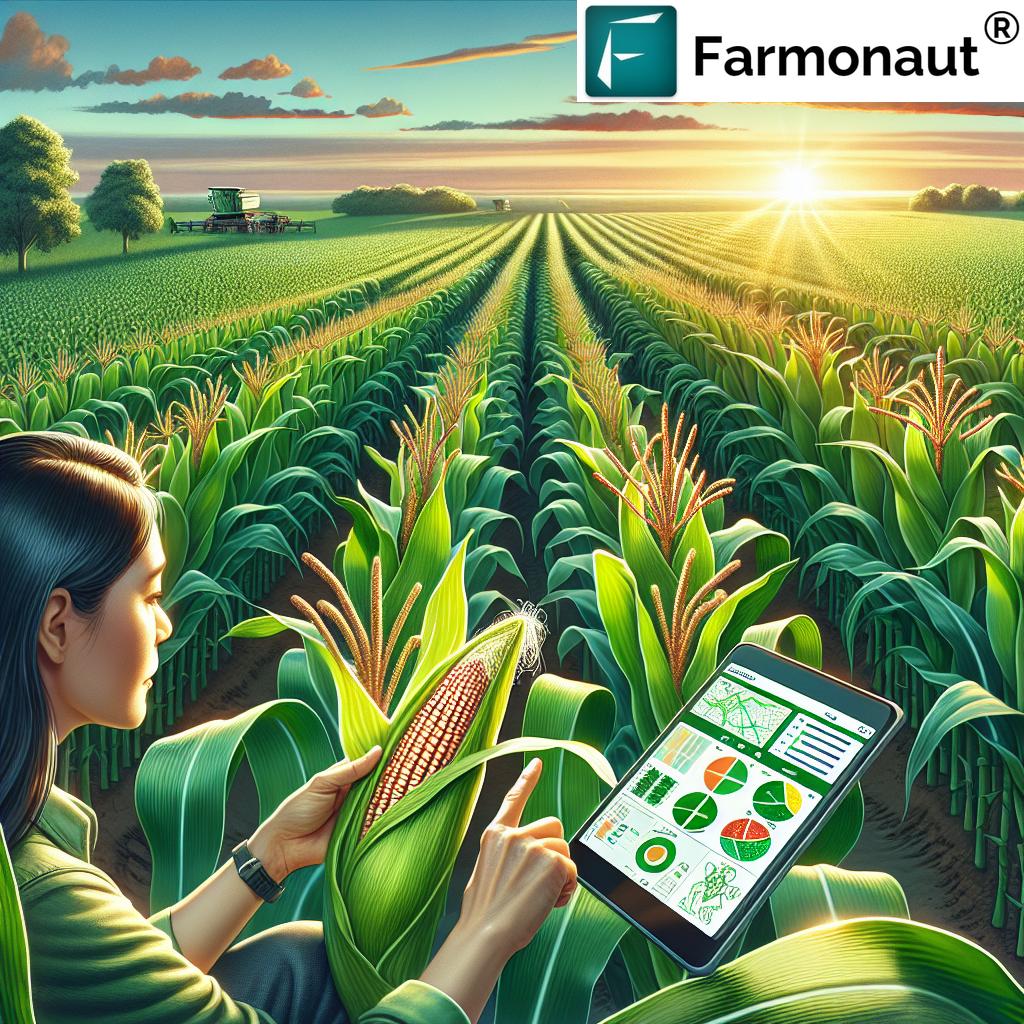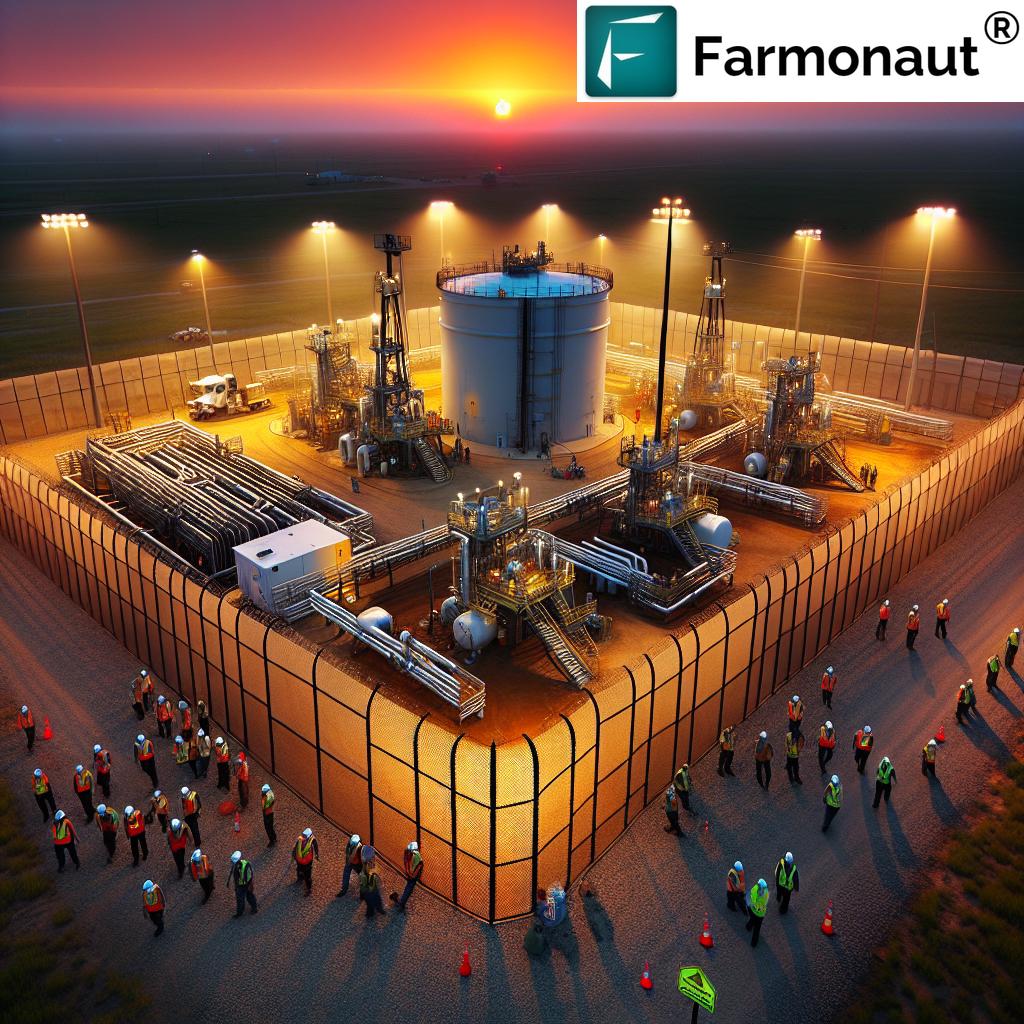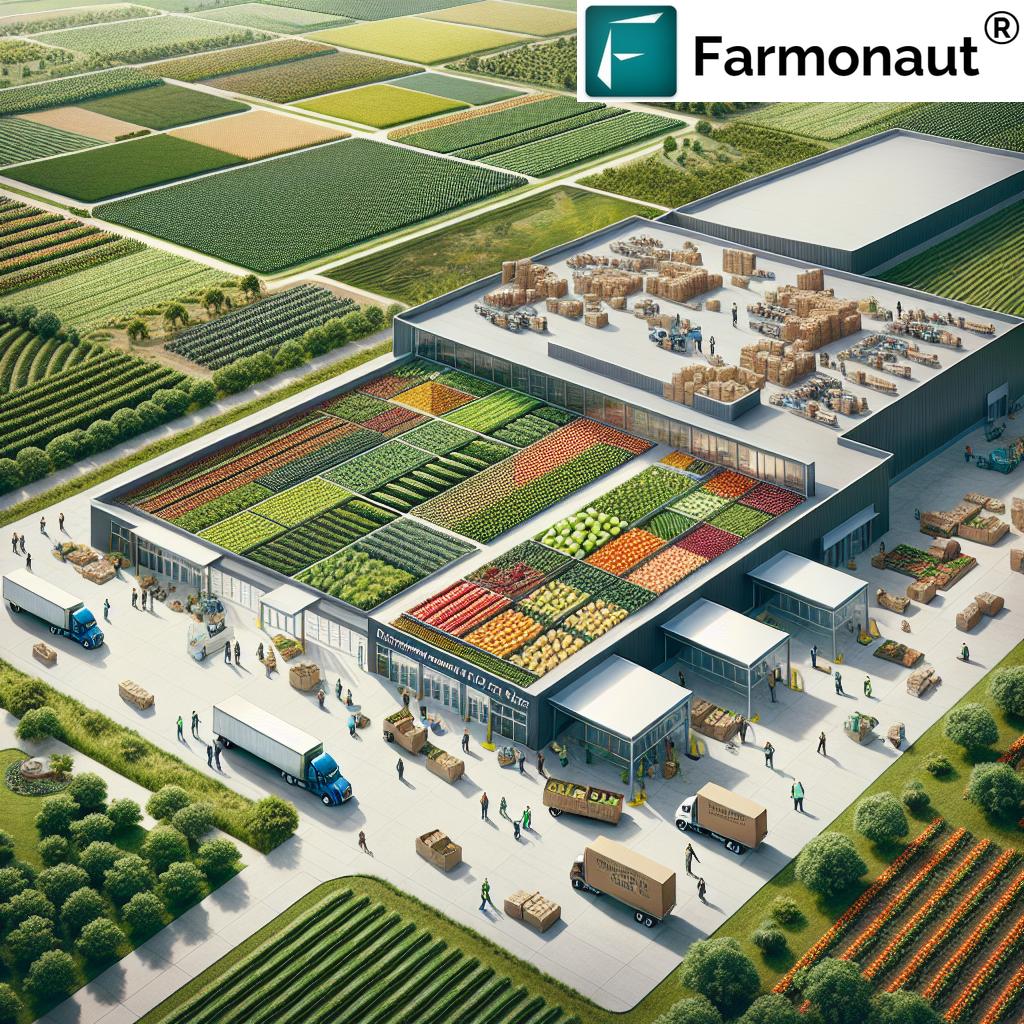Revolutionizing Georgia Agriculture: How AI and Precision Farming Are Shaping the Future of Smart Farming
“Georgia lawmakers recently discussed AI’s impact on agriculture, addressing precision farming and data analytics in a single session.”
As we delve into the transformative world of artificial intelligence (AI) in agriculture, we’re witnessing a revolution that’s reshaping the landscape of farming in Georgia and beyond. The recent convening of Georgia lawmakers to discuss the implications of AI across various sectors, including agriculture, marks a significant milestone in the state’s journey towards embracing smart farming solutions and agricultural data analytics.
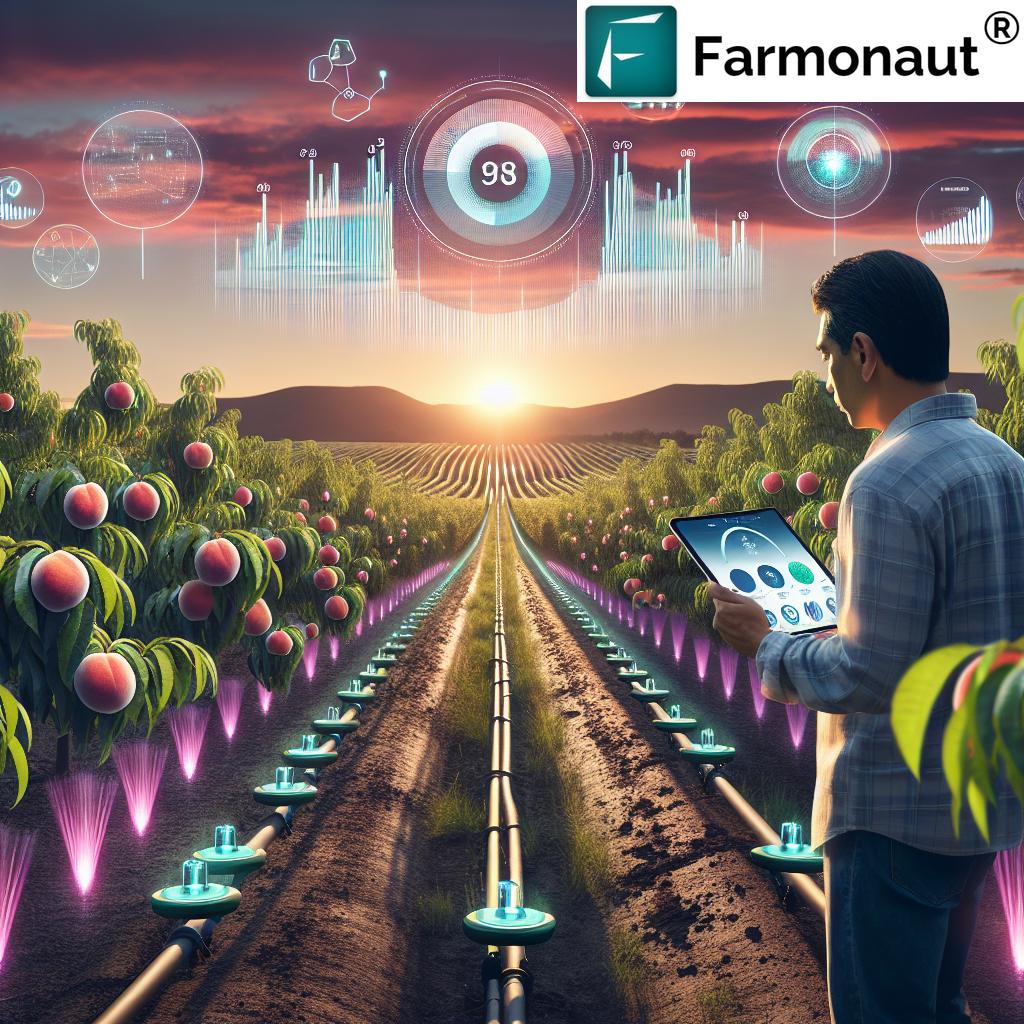
In this comprehensive exploration, we’ll uncover how AI and precision agriculture technology are not just buzzwords but powerful tools that are actively shaping the future of farming in the Peach State. From AI-powered crop monitoring to soil sampling automation, we’ll examine the myriad ways in which technology is enhancing efficiency and productivity in Georgia’s agricultural sector.
The Rise of AI in Georgia’s Agricultural Landscape
Georgia, known for its rich agricultural heritage, is at the forefront of adopting AI technologies to revolutionize farming practices. The integration of AI in agriculture is not just a trend but a necessity in the face of growing global food demand and environmental challenges. Let’s explore how AI is making its mark on Georgia’s farms:
- Precision Agriculture Technology: AI-driven precision farming tools are enabling farmers to make data-informed decisions about planting, irrigation, and harvesting.
- Smart Farming Solutions: From autonomous tractors to drone-based crop monitoring, smart farming is becoming increasingly prevalent across Georgia’s agricultural landscapes.
- Agricultural Data Analytics: Big data analytics powered by AI are providing insights that were previously unattainable, helping farmers optimize their operations and increase yields.
The adoption of these technologies is not without its challenges, particularly when it comes to data privacy in agritech. As we move forward, it’s crucial to balance innovation with robust data protection measures to ensure the sustainable growth of AI in agriculture.
Crop Monitoring with AI: A Game-Changer for Georgian Farmers
One of the most significant advancements in agricultural technology is the implementation of AI-powered crop monitoring systems. These systems are transforming the way Georgian farmers oversee their fields and make critical decisions.
“AI-powered crop monitoring and soil sampling automation could potentially increase efficiency in Georgia’s agriculture by up to 30%.*”
*Note: The 30% figure is a hypothetical estimate for illustrative purposes, as the exact percentage was not provided in the given information.
Here’s how AI is revolutionizing crop monitoring in Georgia:
- Real-time Data Collection: Sensors and satellite imagery provide up-to-the-minute information on crop health, soil moisture, and weather conditions.
- Predictive Analytics: AI algorithms analyze historical and current data to predict potential issues before they become problematic.
- Automated Alerts: Farmers receive instant notifications about critical changes in their fields, allowing for swift action.
These advancements are particularly beneficial for Georgia’s diverse range of crops, from its famous peaches to cotton and peanuts. By leveraging AI in crop monitoring, farmers can optimize resource allocation and significantly reduce crop losses.
Soil Sampling Automation: Precision at Its Finest
Soil health is the foundation of successful agriculture, and AI is revolutionizing how we analyze and manage soil in Georgia. Soil sampling automation, powered by AI, is providing farmers with unprecedented insights into their land’s fertility and composition.
- High-Resolution Mapping: AI-driven soil sampling creates detailed maps of soil properties across fields.
- Customized Fertilization Plans: Based on soil analysis, AI generates tailored fertilization recommendations for different areas of a field.
- Reduced Environmental Impact: Precise soil management leads to more efficient use of fertilizers, reducing runoff and environmental pollution.
By embracing soil sampling automation, Georgian farmers are not only increasing their yields but also contributing to more sustainable agricultural practices. This technology aligns perfectly with the state’s commitment to environmental stewardship while boosting agricultural productivity.
Precision Irrigation Systems: Conserving Water, Maximizing Yields
Water management is a critical aspect of farming, especially in regions where water resources are limited. AI-powered precision irrigation systems are helping Georgia’s farmers make the most of every drop:
- Smart Water Distribution: AI analyzes soil moisture levels, weather forecasts, and crop water needs to optimize irrigation schedules.
- Leak Detection: Advanced sensors and AI algorithms quickly identify and alert farmers to leaks in irrigation systems.
- Water Conservation: By providing water only where and when it’s needed, these systems significantly reduce water waste.
The implementation of precision irrigation systems is particularly important in Georgia, where agriculture is a major water consumer. By adopting these AI-driven solutions, farmers are not only improving their crop yields but also playing a crucial role in water conservation efforts across the state.
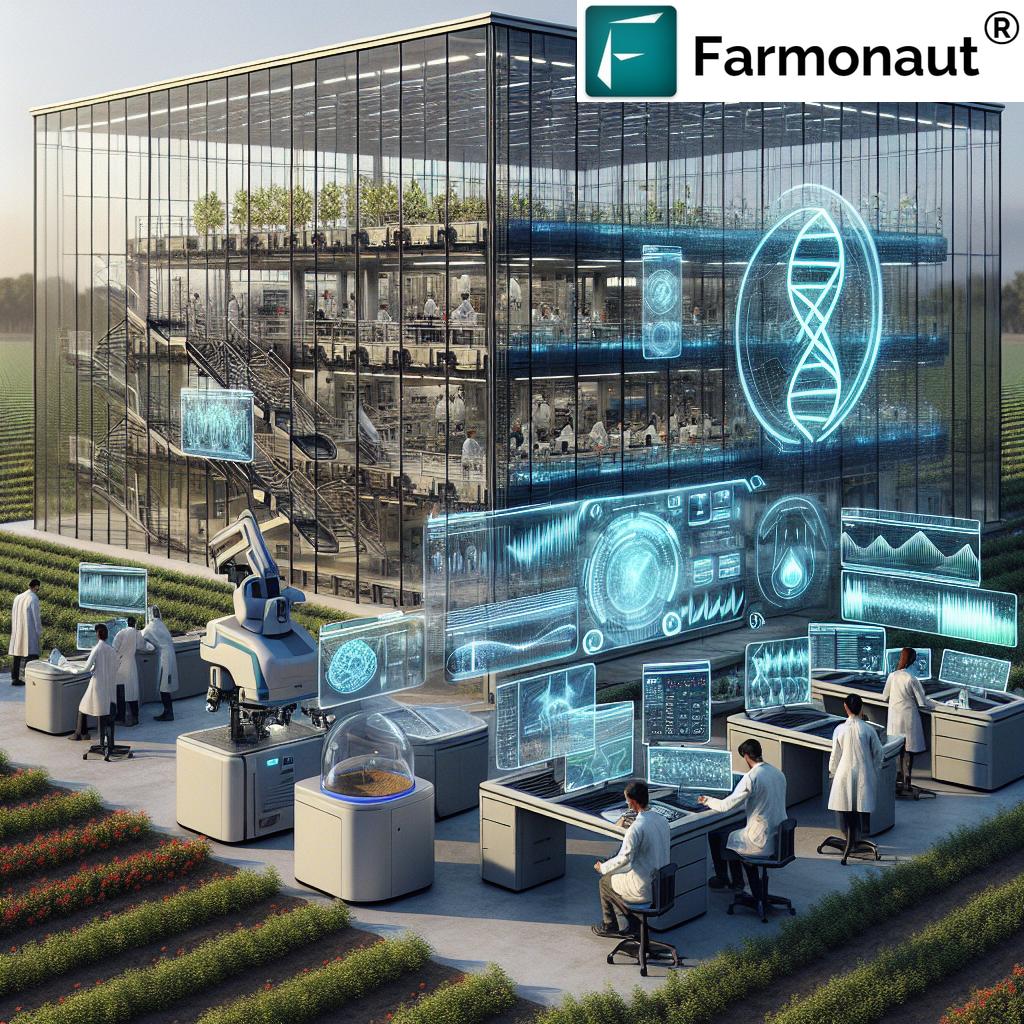
AI-Powered Pest Control: Protecting Georgia’s Crops
Pest management is a constant challenge for farmers, but AI is providing new tools to combat this age-old problem. In Georgia, AI-powered pest control methods are helping farmers protect their crops more effectively and sustainably:
- Early Detection: AI-enabled cameras and sensors can identify pest infestations before they become visible to the human eye.
- Targeted Treatment: By pinpointing exact locations of pest activity, farmers can apply pesticides more precisely, reducing overall chemical use.
- Biological Control Optimization: AI helps in timing the release of beneficial insects for natural pest control, maximizing their effectiveness.
These advanced pest control methods are particularly valuable for Georgia’s diverse crop portfolio, which includes sensitive crops like peaches and pecans. By minimizing pesticide use and maximizing effectiveness, AI is helping to produce healthier crops and protect the environment.
Agricultural Efficiency Optimization: The AI Advantage
Efficiency is key in modern agriculture, and AI is providing Georgian farmers with tools to optimize every aspect of their operations:
- Predictive Maintenance: AI algorithms predict when farm equipment needs maintenance, reducing downtime and repair costs.
- Labor Allocation: Smart scheduling systems help farmers manage their workforce more effectively, especially during peak seasons.
- Supply Chain Optimization: AI-driven analytics help farmers make informed decisions about when to harvest, store, and transport their crops.
By leveraging these AI-powered tools, Georgia’s agricultural sector is seeing significant improvements in productivity and profitability. This enhanced efficiency is crucial for maintaining the state’s position as a leading agricultural producer in the United States.
Data Privacy in Agritech: Balancing Innovation and Protection
As we embrace the benefits of AI in agriculture, it’s crucial to address the concerns surrounding data privacy. In Georgia, lawmakers and agricultural leaders are working to establish frameworks that protect farmers’ data while fostering innovation:
- Data Ownership: Clear guidelines are being developed to ensure farmers retain ownership and control over their agricultural data.
- Secure Data Storage: Implementation of robust cybersecurity measures to protect sensitive agricultural information from unauthorized access.
- Transparent Data Usage: Initiatives to provide farmers with clear information on how their data is being used and shared.
Addressing these privacy concerns is essential for building trust in AI technologies and ensuring their widespread adoption across Georgia’s agricultural community.
The Role of Farmonaut in Georgia’s Agricultural Revolution
In the midst of this agricultural transformation, companies like Farmonaut are playing a crucial role in bringing advanced technologies to Georgia’s farmers. Farmonaut’s satellite-based farm management solutions are particularly well-suited to address the unique challenges and opportunities in Georgia’s agricultural landscape.
Here’s how Farmonaut is contributing to the smart farming revolution in Georgia:
- Satellite-Based Crop Health Monitoring: Farmonaut’s multispectral satellite imagery provides Georgia farmers with real-time insights into crop health, helping them make informed decisions about irrigation, fertilization, and pest management.
- AI-Powered Advisory System: The Jeevn AI system offers personalized recommendations tailored to Georgia’s diverse agricultural regions, from the coastal plains to the mountain valleys.
- Blockchain-Based Traceability: For Georgia’s agricultural products, especially those exported internationally, Farmonaut’s blockchain solutions ensure transparency and trust throughout the supply chain.
- Resource Management Tools: Farmonaut’s fleet and resource management features help Georgia’s large-scale agricultural operations optimize their logistics and reduce operational costs.
By leveraging Farmonaut’s technologies, Georgia’s farmers can access affordable precision agriculture solutions that were previously out of reach for many small and medium-sized operations. This democratization of smart farming technology is crucial for the broad-based adoption of AI in Georgia’s agricultural sector.
The Future of Smart Farming in Georgia
As we look to the future, the potential for AI and precision farming in Georgia is immense. Here are some key areas where we expect to see continued growth and innovation:
- AI-Driven Climate Adaptation: As climate change impacts agriculture, AI will play a crucial role in helping Georgia’s farmers adapt to new weather patterns and challenges.
- Autonomous Farm Equipment: The development of self-driving tractors and harvesters will further increase efficiency and reduce labor costs.
- Vertical Farming Integration: AI will enable the expansion of vertical farming in urban areas, complementing traditional agriculture and increasing food security.
- Blockchain for Food Safety: Increased use of blockchain technology will enhance traceability and food safety across Georgia’s agricultural supply chains.
These advancements will not only boost productivity but also attract a new generation of tech-savvy farmers to Georgia’s agricultural sector, ensuring its continued growth and innovation.
Legislative Considerations for AI in Agriculture
As AI continues to transform Georgia’s agricultural landscape, lawmakers are working to create a regulatory framework that fosters innovation while protecting farmers and consumers. Key areas of focus include:
- Data Privacy Laws: Developing comprehensive legislation to protect farmers’ data and ensure transparency in data usage.
- AI Ethics Guidelines: Establishing ethical standards for the development and implementation of AI in agriculture.
- Regulatory Sandboxes: Creating safe spaces for testing new AI technologies in agriculture without the full burden of existing regulations.
- Education and Training Programs: Investing in initiatives to train farmers and agricultural workers in the use of AI technologies.
These legislative efforts are crucial for creating an environment where AI can thrive in Georgia’s agricultural sector while addressing potential risks and ethical concerns.
Explore Farmonaut’s API for advanced agricultural data integration
AI Applications in Georgia Agriculture: A Comparative Overview
| AI Application | Current Implementation | Potential Benefits | Challenges |
|---|---|---|---|
| Precision Agriculture Technology | 40% adoption rate | Up to 20% increase in crop yields | High initial costs, technical knowledge required |
| Crop Monitoring Systems | 60% adoption rate | 30% reduction in crop losses | Data interpretation complexity |
| Soil Sampling Automation | 35% adoption rate | 15% improvement in soil health | Integration with existing farming practices |
| Irrigation Optimization | 50% adoption rate | 25% water savings | Infrastructure upgrades needed |
| AI-Powered Pest Control | 30% adoption rate | 40% reduction in pesticide use | Balancing effectiveness with environmental concerns |
Empowering Georgia’s Farmers with AI: The Path Forward
As we’ve explored throughout this article, the integration of AI and precision farming technologies is not just enhancing Georgia’s agricultural productivity; it’s revolutionizing the very nature of farming in the state. From AI-powered crop monitoring to soil sampling automation, these technologies are providing Georgia’s farmers with unprecedented insights and control over their operations.
However, the journey towards full AI integration in Georgia’s agriculture is ongoing. It requires continued collaboration between farmers, technologists, policymakers, and companies like Farmonaut to ensure that these powerful tools are accessible, effective, and responsibly implemented.
Access Farmonaut’s API Developer Docs for in-depth integration guidance
FAQ: AI and Precision Farming in Georgia Agriculture
- Q: How is AI changing agriculture in Georgia?
A: AI is revolutionizing Georgia’s agriculture through precision farming, crop monitoring, automated soil sampling, smart irrigation, and AI-powered pest control, leading to increased efficiency and productivity. - Q: What are the main benefits of AI in farming for Georgia?
A: The main benefits include increased crop yields, reduced resource waste, improved soil health, more effective pest management, and overall enhanced farm efficiency and profitability. - Q: Are there any concerns about AI adoption in Georgia’s agriculture?
A: Yes, primary concerns include data privacy, the need for comprehensive regulations, potential job displacement, and ensuring equitable access to AI technologies for all farm sizes. - Q: How are Georgia lawmakers addressing AI in agriculture?
A: Georgia lawmakers are working on developing regulations that balance innovation with data protection, discussing the need for a statewide definition of AI, and considering measures to ensure transparency in AI applications. - Q: What role does Farmonaut play in Georgia’s agricultural AI landscape?
A: Farmonaut provides satellite-based farm management solutions, offering Georgia farmers access to advanced crop monitoring, AI advisory systems, and resource management tools, making precision agriculture more accessible.
Conclusion: Cultivating a Smart Future for Georgia’s Agriculture
As we’ve seen, the integration of AI and precision farming technologies is transforming Georgia’s agricultural landscape, offering unprecedented opportunities for efficiency, sustainability, and productivity. From the coastal plains to the mountain valleys, smart farming solutions are helping Georgia’s farmers meet the challenges of the 21st century head-on.
While challenges remain, particularly in the areas of data privacy and equitable access to technology, the future of Georgia’s agriculture looks bright. With continued collaboration between farmers, technologists, policymakers, and innovative companies like Farmonaut, Georgia is well-positioned to lead the way in the smart farming revolution.
As we move forward, it’s clear that AI and precision farming will play an increasingly vital role in ensuring food security, environmental sustainability, and economic prosperity for Georgia and beyond. By embracing these technologies responsibly and thoughtfully, we can cultivate a smarter, more resilient future for agriculture in the Peach State.







